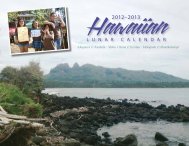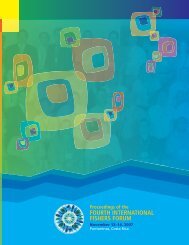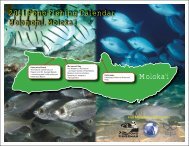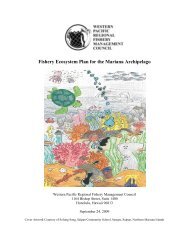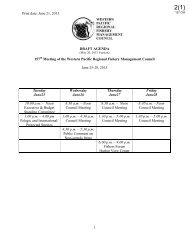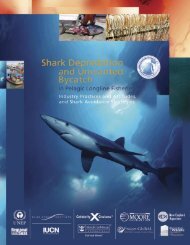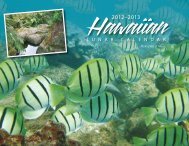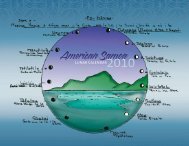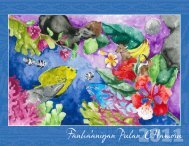Hawaii FEP - Western Pacific Fishery Council
Hawaii FEP - Western Pacific Fishery Council
Hawaii FEP - Western Pacific Fishery Council
You also want an ePaper? Increase the reach of your titles
YUMPU automatically turns print PDFs into web optimized ePapers that Google loves.
subsistence was important (not just a necessary component but a desirable one) to the lifestyle ofMolokai. (Matsuoka et al. in McGregor 2006). Molokai is likely to represent the high end of thescale of subsistence activities among the islands due to its relative isolation, lack of employmentopportunities, rural character and continued availability of natural resources. However,subsistence fishing, hunting and gathering are important and respected aspects of life for many<strong>Hawaii</strong> residents.Fishing plays many roles in the lives of <strong>Hawaii</strong> residents and tourists, in addition to providingsubsistence resources. A myriad of books, television shows and magazines highlight variousaspects of <strong>Hawaii</strong>’s fisheries and fishery resources and local newspapers provide livelycommentary on fishery issues. <strong>Hawaii</strong>’s image as a marine wonderland is a major tourism drawand many tourists are likely to either view fish (e.g., go snorkeling visit an aquarium or buyattire, souvenirs or art with a fish motif), catch fish (e.g., go fishing) or eat fish during their visit.Indeed locally caught fish comprise many of <strong>Hawaii</strong>’s “signature dishes” which are a tourismdraw in themselves.Shoreline fishing is an important social and competitive activity in <strong>Hawaii</strong>. Shoreline fishingtournaments are extremely popular and both young and old fishermen can be seen along<strong>Hawaii</strong>’s shores every weekend (HDAR 2000). Many of these will be targeting ulua but pulsesof weke, akule and opelu will also draw crowds of fishermen to certain areas, includingHonolulu’s shoreline and major harbors. Smaller groups gather regularly at harbors, beaches,cliffs and breakwalls in the early morning and evening hours to fish and talk story with theirfriends and neighbors.Fishing clubs provide another avenue for social interaction, support, and service. Schultz et al.(2006) provide a list of 25 fishing clubs that were active in 2003. Many of <strong>Hawaii</strong>’s fishing clubsfocus on pelagic fishing; however the majority of club members are also likely to target nonpelagicspecies over the course of a year. Fishing clubs usually meet at least one time per monthand often engage in community services such as providing fishing opportunities for young,disabled or senior citizens who would otherwise be unable to participate. Not only do fishingclubs allow for social interaction between old friends, they also bring together people from manydisparate social and economic groups that may not otherwise interact on a regular basis (Schultzet al. 2006).As described in Chapter 4, landings by commercial fishermen (those who sell at least one fishduring the year) are captured through the State’s reporting system. The volume and ex-vesselvalue of these landings are described in Chapter 4. Due to the lack of either State or Federalreporting requirements for recreational (i.e., non-commercial, including subsistence) fishermen,available estimates of their landings are based primarily on data collected through intermittentcreel and phone surveys. Estimates of recreational catches have varied widely over the pastdecade, perhaps due to differences in survey definitions and/or wording, or perhaps due todifferences in sample design and subsequent data extrapolation. In several recent cases, nodefinition of the term “recreational” was provided to survey respondents, which is believed tohave resulted in double-counting of catches by fishermen who consider their motivation forfishing to be recreational, but who nevertheless sell some of their catch. Assuming that theserespondents followed State laws, their catches are categorized as, and included with, other131



